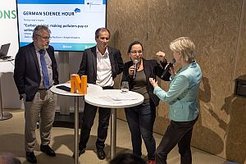Tracking down anthropogenic emissions at COP23

Can we learn more about anthropogenic emissions through atmospheric measurements of trace gases like carbon dioxide? This was the question addressed on Thursday, November 9, 2017 by Julia Marshall, scientific group leader at MPI for Biogeochemistry, during a session at COP23. Alongside Werner Kutsch of the international Integrated Carbon Observation System (ICOS) network and Gerhard Ehret of the German Aerospace Center (DLR), she presented at the “German Science Hour” on the topic “The Fate of Greenhouse Gases: the Knowns and the Unknowns”.
The German Science Hour is an event organized by the Federal Ministry of Education and Research (BMBF) taking place daily at the German Pavilion during the UN Climate Change Conference COP23 in Bonn, Germany. The German Science Hour aims at strengthening the science-policy dialogue at COP23 by presenting state-of-the-art climate research in an entertaining way.
Julia Marshall’s contribution, entitled “Tracking down anthropogenic emissions”, was focused on the use of inverse or top-down modeling to separate the anthropogenic signals from the much larger biogenic fluxes. “Because these signals have a different spatial distribution, high resolution measurements can help, such as those that might be provided by imager-type satellites,” Marshall explains. She hopes such measurements will become available over the next decade, as the European Commission is currently considering adding a constellation of such imager satellites to its Sentinel programme of operational satellites.
Marshall is involved in this proposed mission both through her role as an advisor on the CO2 Monitoring Task Force convened by the European Space Agency (ESA) and through two related ESA-funded studies. She also participates in the linked EU-H2020 project CHE (CO2 Human Emissions). CHE aims to develop the modeling framework to deal with these potential new measurements, combined with surface-based measurements of additional tracers that can help trace atmospheric signals to specific surface processes, such as fossil fuel combustion.












